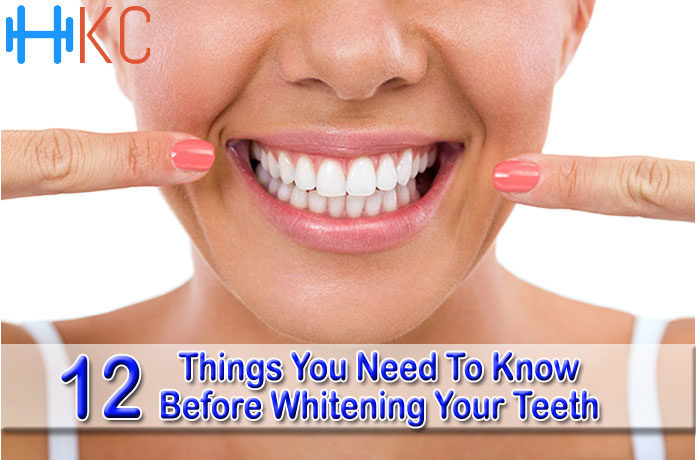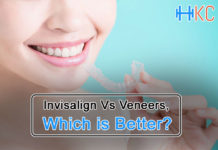Who doesn’t want a bright, white, sparkling smile? Everyone wants their pearly whites to shine even brighter. Your teeth losses its luster over time due to some dingy gray or yellow stains. Blame it to the tea, coffee, alcohol or tobacco, crooked or discolored teeth can hamper your confidence.
This is why more and more people are opting for teeth whitening to get that Hollywood smile. But with a plethora of chemical whitening products out there, it is all too easy to damage your teeth permanently.
There is nothing wrong with having a goal of gaining a gleaming smile of your dream with teeth whitening. But before jumping in, here are some things you need to know.
It Is Better To Avoid Whitening on Damaged Teeth
While having untreated issues like gum disease, exposed roots, cavities or crooked teeth, whitening your teeth is not a good idea to go with. Whitening on damaged teeth will cause further pain and problems.
Also, you will end up wasting time and money as the whitening likely won’t take on damaged teeth. An ethical dentist will recommend you to fix the problem first to avoid any complications.
Whitening Doesn’t Last Forever
Yellowing of teeth is part of the aging process and with acidic foods and drinks we consume, it is easy to have stained teeth. But if you think opting for teeth whitening will solve your problem permanently, you are mistaken.
No matter how you whiten your teeth, it is not going to last forever. Most of the results last from 6 months up to 2 years but again it will depend on how easily your teeth stain and the diet you take. Moreover, there will be a rebound effect in which your teeth will relapse slightly in shade.
The Results of Teeth Whitening May Vary
The condition of your teeth when you started will highly impact the result you get. Teeth whitening is not going to erase all the damage you’ve done to your teeth over your lifetime.
The better the condition of your teeth, the greater the results will be. If you have been following good oral hygiene with regular brushing and flossing, you will have whiter teeth after treatment.
Not All Teeth Whiteners Are Equal
Different whitening agents have different strengths and potential. An at-home whitening strip from the drug store will give you a different result from the in-office treatment.
Teeth whitening strips usually have a lower concentration of active ingredients as compared to the dentist-made custom trays used at home with their prescription-strength whitener.
Teeth Whitening Strips Might Not Work For Everyone
At-home whitening strips might not be the most effective teeth whitening choice for everyone. For people with straight teeth, it may work as they are designed to lay flat across the tooth surface. However, when you have misaligned or crooked teeth, it might not give you a good result.
This is because the strips can’t get to all the nooks and crannies of your tooth. Thus, chances are it may leave some areas lighter than others while giving an uneven look to your teeth.
It Is Normal to Have Sensitivity after Teeth Whitening
Tooth sensitivity is a common side effect of teeth whitening. During the whitening process, the gel causes the tubules, or pores, of the teeth to open. Hence the teeth become temporarily dehydrated which lessens its ability to insulate the nerve from the changing temperature.
You can experience sensitivity up to 12-36 hours after whitening. But if it lasts longer or feels severe, using desensitizing toothpaste can relieve the sensitivity. You can even opt for the post-whitening fluoride treatment recommended by dentists and hygienists to nourish your teeth and promote rehydration.
Teeth Whitening Toothpaste Only Lightens Your Teeth Superficially
When you hear “whitening toothpaste” the idea of instant whitening may tempt you to go for it. But the truth is, such toothpaste usually just cleans your teeth superficially by being harsher than regular toothpaste. It can remove the staining, but can’t change the internal color of your teeth.
If you want to use such toothpaste, look for the one with citroxain and avoid using it more than once a week. By being too abrasive on teeth, whitening toothpaste can result in gum recession and sensitivity. So, make sure to brush gently with proper technique and consult a dentist to make sure you are not damaging your teeth.
Professional Teeth Whitening Is Safe
There is a common perception that teeth whitening is damaging for your teeth. However, it is not the complete truth. It is incredibly safe as long as you are using the professional teeth whitening procedure.
Professional teeth whitening is not going to damage your teeth like aggressive brushing as the process involves active ingredients that open pores in your teeth temporarily and lift stains. Once the whitening session is done, your teeth will naturally remineralize and rehydrate.
Teeth Whitening Is Not an Overnight Thing
Many products are there in the market that promises overnight results. In fact, some products claim that it can whiten your teeth in a few minutes. Well, to tell you the truth, it is not possible for any whitening agent to enter deep enough into the teeth safely at that speed.
If it is that easy, do you think dentists would be paid well to create custom-fitted whitening trays? No matter what whitening process you use, it will take as few as 4 days to show the result.
Getting sparkling white teeth takes time. So be patient with the process, and you will see your stains slowly fading away with each whitening session.
Not All Teeth Will Whiten the Same
A professional bleaching treatment may give a wonderful result to some people while some might not be able to enjoy the benefits of whiter teeth. Stains caused due to coffee, smoking or wine can be removed with teeth bleaching.
However, crowns, molding or replacement teeth might not get affected by bleaching agents. Moreover, the whitening process can also be affected by the gum recession and cold sensitivity of the teeth. So, before attempting over-the-counter whitening, it is crucial to consult with your dentist.
Laser Teeth-Whitening Treatments Effect Won’t Last Longer
Just because you spend a fortune at your dentist’s office for ultraviolet and laser teeth-whitening treatments, it doesn’t mean the results will last longer. No doubt such treatments whiten teeth very quickly, but the effect doesn’t last as long as bleaching.
You Need To Avoid Pigmented Food throughout the Treatment
During the whitening process, pores of the teeth are most open. Hence it is recommended to avoid pigmented food for at least 48 hours after teeth whitening.
While white wine or clear spirits are acceptable, it is recommended to avoid red wine, coffee, and smoking. Once done with the whitening completely, you can return to a normal diet.
Final Words
Keep in mind you are investing in your smile with teeth whitening. So, make sure to understand your options and find a dentist near you to seek professional advice before jumping in.
You shouldn’t only focus on achieving pearly white teeth but also healthy teeth. Follow good oral hygiene regimen such as regular brushing and flossing to keep your teeth strong and healthy.
Now that you know these things about teeth-whitening treatment, gear up to have a bright, blemish-free smile.














